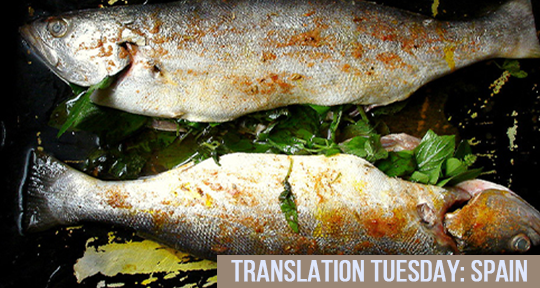This week’s Translation Tuesday features the poetry of Gemma Gorga. The poems revolve around themes of domestic labor and consumption; but they are not what they appear on the surface. Fastidious consideration of fish-flesh or mercury or cautionary affects inherited by one’s grandmother hint at a nuanced understanding of the traces of events left on the body and the mind. “Still the smell does not want to leave them, / as if tiny bags of memory remained,” Gorga writes, indicating the complex and grotesque traces that always remain after affects. Visceral, but not overly descriptive, the style weaves potent materials with potent concepts in metaphoric embraces. These poems show that whole lives, whole beings, can be explained and articulated by the smallest things: an anchovy’s spine, a pellet of mercury, a poem.
Poetics of the Fragment
When you return from the market
you must clean the anchovies,
which means ripping off the head and tail,
removing the thin strips still sticky
with life, the central spine
that detaches with a slight zip,
afterwards washing them,
purifying them under tap water
(even death requires baptism),
making sure no tiny eye remains
trapped in the moist blindness of your fingers,
finally soaking them in vinegar,
waiting until the flesh whitens
cured in acid, cured all the way through.
They have lain for hours beneath the planetary
light of oil and pepper.
Still the smell does not want to leave them,
as if tiny bags of memory remained
hidden in the folds forming matter and air.
Making sure no one sees me,
I smell the backs of my hands
(for the sea trace from fish bellies)
and I know they are yours.
Density
Death must have the same
chemical composition
as mercury.
So far we have only played
with a harmless dose:
a slightly greasy pellet
we gently push up and down
with the tip of our middle finger.
What will it be like
one day
to sink our whole body there,
feel the rising suction
of its metallic cold,
swallow the last
oxygen capsule
we had cautiously concealed—
poor naughty creatures—
at the base of our palate?
Temperatures
Half grumbling, Grandma always said
you cannot daydream in the kitchen.
The milk will boil over while your back
is turned, distracted by something else,
and memory will arise thanks to warm stoves
and foam
will flood the lime tree square
where in summer we girls played hopscotch
and fell into hidden boxes
of melted chocolate and tickling.
Like sad eyes
gestures are also inherited:
I blow gently,
raise the pot from the burner
and wait for the foam
to subside,
calm down,
fall once more
into the enclosed amnesia of white.
Translated from the Catalan by Sharon Dolin
Gemma Gorga was born in Barcelona in 1968. She has published six collections of poetry in Catalan. Her most recent collection Mur (Barcelona: Meteora, 2015) won the Premi de la Critica de Poesia Catalana. Her new book of poems, Viatge al centre, is forthcoming in 2020. She is Professor of Medieval and Renaissance Spanish Literature at the University of Barcelona.
Sharon Dolin is the author of six books of poetry, most recently Manual for Living (University of Pittsburgh Press, 2016). Her translation of Gemma Gorga’s Book of Minutes (Field Translation Series/Oberlin College Press, 2019) received grants from PEN and Institut Ramon Llull. Her memoir Hitchcock Blonde is forthcoming from Terra Nova Press in 2020. She is Associate Editor of Barrow Street Press and directs Writing About Art in Barcelona.
*****
Read more translations on the Asymptote blog:

